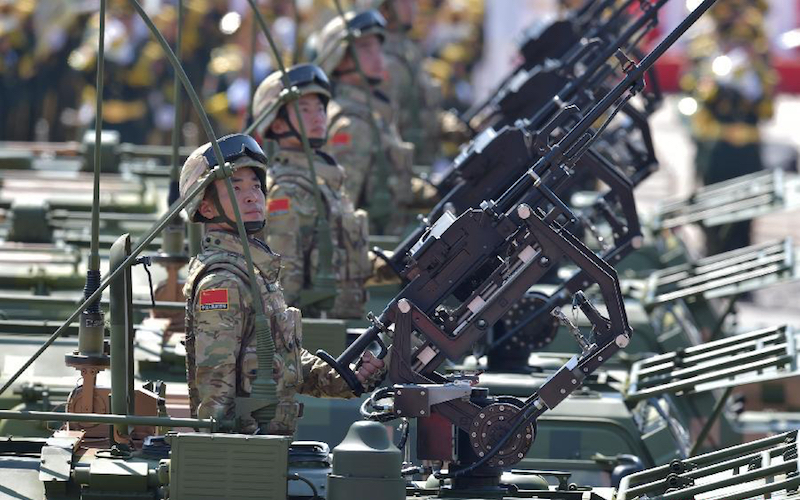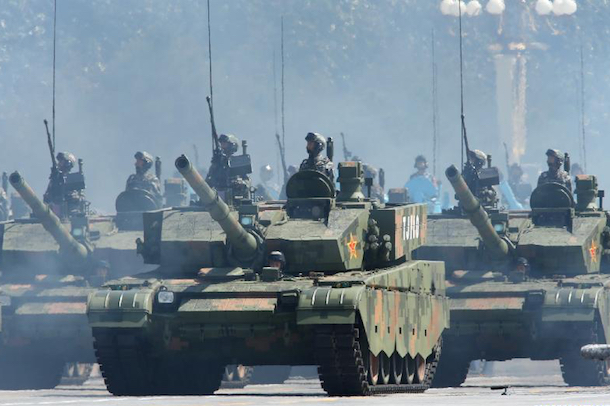
China’s Boastful Display of Military Might and its Economic Weakness
If you fill a glass to the top with water, then add a few milliliters more, you get a bump of surface tension which – with a minute amount of pressure – breaks and spills water down the sides of the glass. This is a fairly accurate metaphor for China’s policies of expansion, land reclamation, military displays of strength and general economic growth plans over the past few years.
Since China was officially formed in 1949 as a ‘people’s democratic dictatorship,’ the country has been one of the fastest growing economies and one of the most dynamic world powers. For the past 60 years, this leadership has steered China through a plethora of global economic recessions and international disputes. However, China is now facing problems from multiple angles: the metaphorical surface tension is close to the breaking point.
China has a strange relationship with much of the world. While the government has touted messages of “harmonious world” and “peaceful rise,” it has nevertheless pursued a deeply aggressive expansionist policy both economically and through the reclamation of territory.
To support these expansions, China’s notoriously vast army has been supplemented with significant air, sea and land support capabilities, including, as displayed in the recent parade commemorating the end of WWII, anti-aircraft and anti-ship long range ballistic weapons.
The parade did not strike fear and trepidation into the hearts of other global superpowers as hoped: rather, it highlighted the myriad of complex relationships that China is not quite a party to. As Kyle Mizokami so eloquently put it, “China’s military parade was a massive display of political weakness,” highlighting the lack of ties China has with other global superpowers.
China’s ambitious war capabilities have landed it in trouble several times recently. Kneejerk reactions by Chinese leaders have pitted the Chinese navy against the US navy on multiple occasions. Most notably, Beijing is enmeshed in a territorial dispute with Taiwan, going back to the banishment of the Kuomintang from the mainland at the hands of forces loyal to the Chinese Communist Party. Since Beijing has never recognized the so-called government in exile in Taipei, Taiwan has engineered a strong relationship with the US, which, should China decide to stake a stronger claim on the country’s territory, would inevitably draw the US into a conflict with the Middle Kingdom. This would also likely draw Russia into the argument, another worrying prospect.

China is also claiming large swathes of land throughout the South China Sea, namely the Spratly Islands – where it has been creating islands and building military bases. As most international conflicts seem to do, the argument has circled back to the vast oil and gas reserves lurking beneath the surface. However, the Spratly Islands are also on a major trading route through the South China Sea, which, should the Chinese gain control, would give China leverage over a vast portion of Eastern trading vessels carrying petroleum. This has angered the US who contest China’s claim to sovereignty over the islands.
Farther afield, in Djibouti, China is at loggerheads with the US military after news emerged that Beijing is planning to build its first offshore military base there. Counting on the support of a subservient African authoritarian leader, Ismail Omar Guelleh, as he is moving away from the U.S. and its commitments to democracy in a bid to secure his fourth consecutive presidential term, Beijing has showered the leadership with multi-billion dollar infrastructure projects. Events came to a head in August, when the Djiboutian authorities evicted a small US military station in order to make space for the Chinese army.
There is a fundamental cultural difference between China and other superpowers. The idea of ‘Mian Zi‘ or ‘face’ is crucially important in China. It symbolizes the position and standing of an individual or institution in the eyes of others. Usually reserved for businesses and families, it is undoubtable that this notion of not losing one’s reputation has made its way into China’s decision-making mechanism. As the parade exposed, Beijing seems to be demanding respect in a somewhat passive aggressive way: boastfully displaying its military might by labeling in big, white English script all the new weapons on show last Thursday.
But Mian Zi cuts both ways. Stemming the public’s desire for more democratic processes, while also saving face in the process, has made the Chinese dependent on providing two core elements to its population: economic growth and nationalist fervor. But, in doing so, the Beijing elite has backed itself into the corner on both international and internal fronts. It created and pressed forward with the promise of infinite economic growth to cow its people into submission, but the recent stock market crash shattered that illusion. Without economic advancement and the endless creation of jobs, the population is likely to stir and break the silent consensus keeping the CCP in power. As such, it is understandable why Beijing drummed up its display of military might in a bid to promote nationalist pride.
However, this double act cannot be kept up for long. If China keeps up its thinly veiled taunts to the US, Beijing might just end up biting off more than it can chew, since its already shabby economic growth is completely dependent of access to Western markets. As Russians recently found out, cold war style political brinksmanship comes with heavy economic costs which might not be borne as stoically by the Chinese. The coming years are going to require an extremely delicate balancing act for the Communist party and flouting its military prowess is unlikely to help in the long run.

